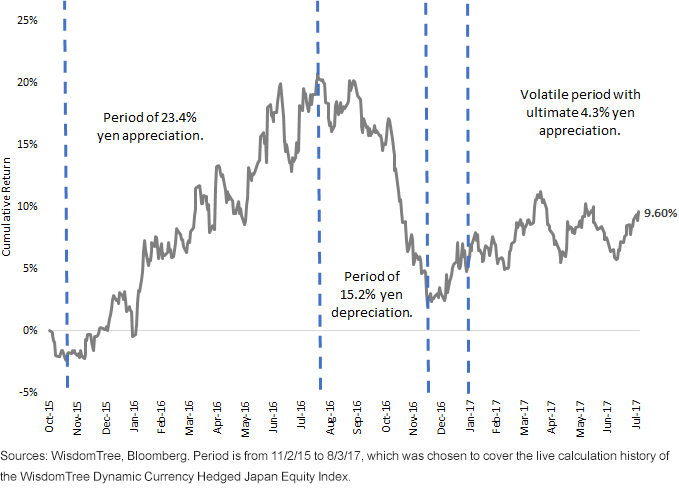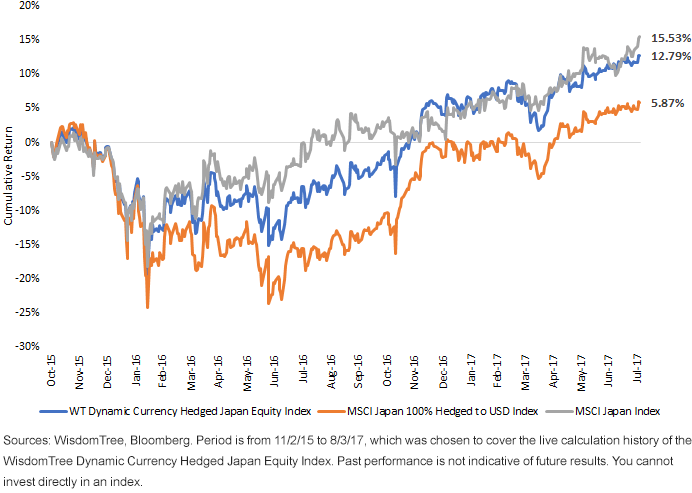Can I Buy Japanese Equities without Knowing What the Yen Will Do?


We’ve written time and time again about the inverse relationship between the performance of the Japanese yen versus Japan’s equities.1
- If the yen is depreciating, companies within Japan that do business abroad get a boost, as their products/services become less expensive and their earnings abroad increase with translation.
- If the yen is appreciating, the opposite occurs, and Japan’s companies are at a disadvantage.
If I knew what the yen would do ahead of time, I think I’d know exactly how I’d want to tailor my investment in Japan’s equities. Unfortunately, currencies are notoriously difficult to forecast with any accuracy.
The Yen Has Exhibited Massive Swings Followed by Recent Volatility

For definitions of indexes in the chart, visit our glossary.
- Strong Yen Period: During this period, the market was beginning to question whether Abenomics would completely fail. A core tenet of the fiscal and monetary policies being employed was a weaker yen, and greater than 20% appreciation in less than 12 months was significant.
- Weak Yen Period: During this period, which seemed to occur with a turn on a dime, any investor who had been able to stomach an investment in Japanese equities when conditions looked dire was rewarded. It was notable that at this point the connection between the movements of the yen and the 10-Year U.S. Treasury note were closely linked. As this interest rate bottomed at 1.36% on July 8, 2016, the yen was nearing its point of peak recent strength. As the “Trump trade” got off the ground toward the end of 2016, we saw the U.S. 10-Year Treasury note leap up to approximately 2.6%, corresponding to when the yen was hitting its recent weakest point.
Where does the U.S. 10-Year Treasury note go from here? Unfortunately, questions like “Will the U.S. get a corporate tax reform plan drafted?” get wrapped into that answer, making it not only an interest rate discussion but also a political discussion—another notoriously difficult realm to forecast.
WisdomTree Introduced Dynamic Currency Hedging in 2015
On November 2, 2015, WisdomTree brought a brand-new concept to currency-hedged equity indexes. While being 100% passively hedged and taking the risk of currency off of the table remains attractive, we understand that 1) many clients retain unhedged benchmarks in their performance comparisons and 2) it may be difficult for some to ignore the ups and downs of currencies moving in waves and not respond.
WisdomTree’s dynamic model, which can change the hedge ratios monthly based on valuation, momentum and interest rate signals, incorporates a response within its Index methodology, allowing clients to not worry about forecasting or responding to the unpredictable ebbs and flows of currency.
Over the Long Haul, Mitigating the Ups and Downs Is the Way to Win
The true beauty of WisdomTree’s dynamic approach is that you don’t need to know what the yen will do to make a case to own Japan within a broader portfolio context—the strategy will make adjustments as market conditions change to mitigate the risk of being on the wrong side of a big currency move. We saw some of those moves earlier, so even in its short period of live history the WisdomTree Dynamic Currency Hedged Japan Equity Index already has been tested.
Dynamic Hedged Approach Outperformed 100% Passive Hedge while the Yen Has Been Stubborn

- While we can tell a great story as to why the yen should depreciate, whether it does or when it does can be another matter entirely. Over the live history of the WisdomTree Dynamic Currency Hedged Japan Equity Index, the yen has appreciated, and being passively 100% hedged has not been the ideal strategy. WisdomTree’s dynamic model has helped keep pace with the fully unhedged approach. This is what we believe mitigating the risk of being on the “wrong” side of the yen looks like.
While being 100% passively hedged is still a concept in which we believe—the negative correlation between Japan’s equities and currency remains alive and well—it’s important that people recognize that being 100% on one side or the other of the currency question is no longer the only option.
1Refers to MSCI Japan Index universe.
Important Risks Related to this Article
Investments focused in Japan increase the impact of events and developments associated with the region, which can adversely affect performance.
Investments in currency involve additional special risks, such as credit risk and interest rate fluctuations.

Christopher Gannatti began at WisdomTree as a Research Analyst in December 2010, working directly with Jeremy Schwartz, CFA®, Director of Research. In January of 2014, he was promoted to Associate Director of Research where he was responsible to lead different groups of analysts and strategists within the broader Research team at WisdomTree. In February of 2018, Christopher was promoted to Head of Research, Europe, where he was based out of WisdomTree’s London office and was responsible for the full WisdomTree research effort within the European market, as well as supporting the UCITs platform globally. In November 2021, Christopher was promoted to Global Head of Research, now responsible for numerous communications on investment strategy globally, particularly in the thematic equity space. Christopher came to WisdomTree from Lord Abbett, where he worked for four and a half years as a Regional Consultant. He received his MBA in Quantitative Finance, Accounting, and Economics from NYU’s Stern School of Business in 2010, and he received his bachelor’s degree from Colgate University in Economics in 2006. Christopher is a holder of the Chartered Financial Analyst Designation.

